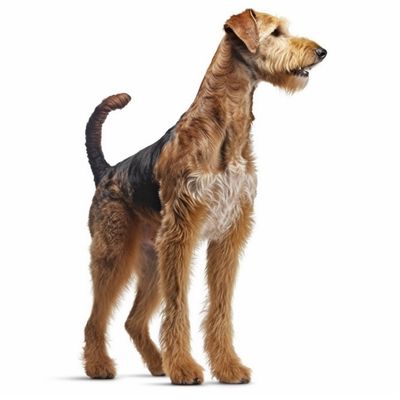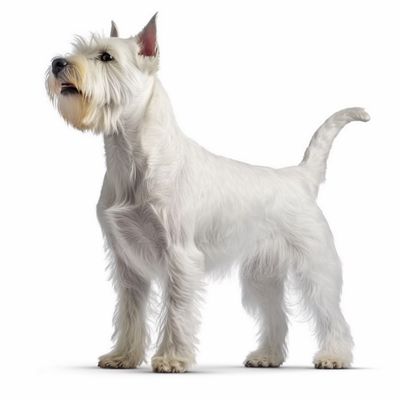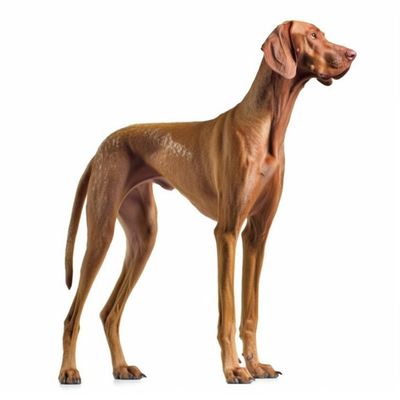Airedale Terrier - vs - West Highland White Terrier - vs - Vizsla

Airedale Terriers are medium-sized dogs, weighing 40-65 lbs, with a height of 22-24 inches.
Airedale Terriers have a high energy level and require regular exercise and mental stimulation.
Airedale Terriers need a significant amount of exercise, including daily walks, runs, and opportunities for play and exploration.
Airedale Terriers are intelligent and trainable, but can be independent thinkers. Consistent, positive reinforcement is essential.
Airedale Terriers are highly intelligent dogs and excel in various dog sports and activities, especially those involving agility and tracking.
Airedale Terriers can adapt to different living situations, but they need plenty of space and exercise to thrive.
Airedale Terriers are good with children when properly socialized and supervised.
Airedale Terriers can get along well with other pets, especially when raised together.
Airedale Terriers can tolerate colder temperatures, thanks to their dense, wiry coats.
Airedale Terriers can tolerate hot climates but need to be monitored for signs of overheating during exercise.
Airedale Terriers have a wiry coat that sheds minimally, making grooming relatively easy.
Airedale Terriers require regular grooming, including brushing and occasional hand-stripping or clipping to keep their coats clean and healthy.
Airedale Terriers have average bark tendencies and may bark for various reasons, such as alerting their owners or during playtime.
Airedale Terriers are generally healthy dogs but may still require regular veterinary checkups and preventative care.

West Highland White Terriers are small-sized dogs, weighing 15-20 lbs, with a height of 10-11 inches.
West Highland White Terriers have a medium energy level, enjoying playtime and daily walks.
West Highland White Terriers need regular exercise, including daily walks and playtime.
Westies are intelligent and trainable, but can be stubborn at times. Consistent, positive reinforcement is important.
Westies are intelligent dogs and can learn tricks and commands with consistent training.
Westies can adapt well to different living situations, including apartments and larger homes, as long as their exercise needs are met.
Westies can be good with children, but supervision and proper handling are important to prevent injury to the dog.
Westies can get along with other pets, but early socialization is important.
Westies can tolerate colder temperatures thanks to their double coat, but proper protection is still necessary during extreme cold.
Westies can tolerate hot climates but need to be monitored for signs of overheating during exercise.
Westies have a double coat that sheds minimally, making grooming relatively easy.
Westies require regular grooming, including brushing and occasional bathing to keep their coats clean and healthy.
West Highland White Terriers have average bark tendencies and may bark for various reasons, such as alerting their owners or during playtime.
West Highland White Terriers may have some health issues, requiring regular veterinary checkups and preventative care.

Vizslas are medium-sized dogs, weighing 45-65 lbs, with a height of 21-24 inches.
Vizslas have a high energy level and require plenty of exercise and mental stimulation.
Vizslas need a significant amount of exercise, including daily walks, runs, and interactive play sessions.
Vizslas are intelligent and eager to please, making them easy to train with positive reinforcement.
Vizslas are highly intelligent dogs and excel in various dog sports and activities.
Vizslas can adapt to various living situations, but they thrive in active households that can provide ample exercise.
Vizslas are generally good with children when properly socialized and can be energetic playmates.
Vizslas can get along well with other pets, especially when raised together.
Vizslas have short coats and may not be well-suited to extremely cold climates without proper protection.
Vizslas can tolerate hot climates, but they need to be monitored for signs of overheating during exercise.
Vizslas have short coats and shed minimally, making them low-maintenance in terms of grooming.
Vizslas require minimal grooming, with occasional brushing and bathing to keep their coats clean and healthy.
Vizslas have average bark tendencies and may bark for various reasons, such as alerting their owners or during playtime.
Vizslas are generally healthy, but regular veterinary checkups and preventative care are still necessary.



